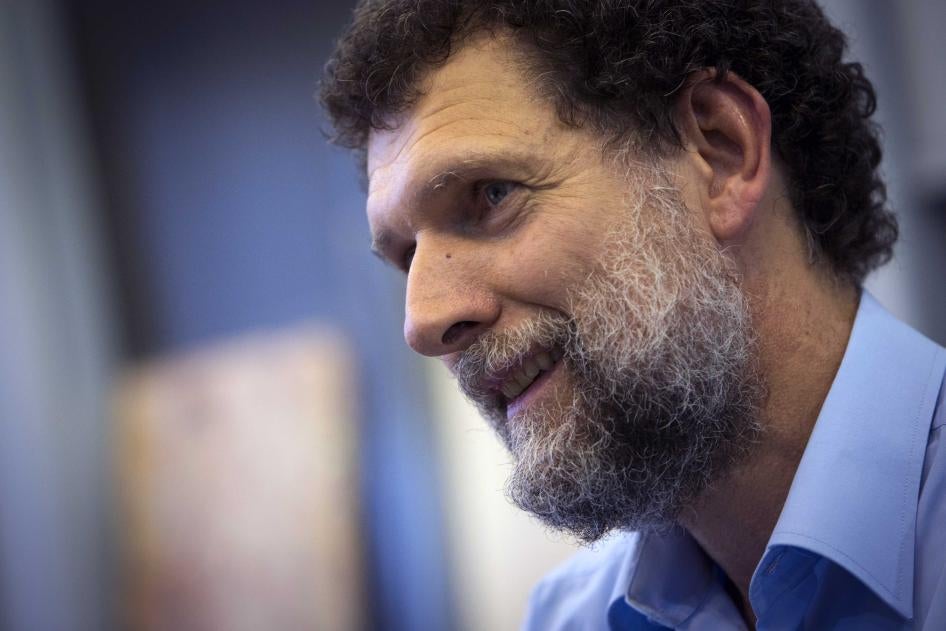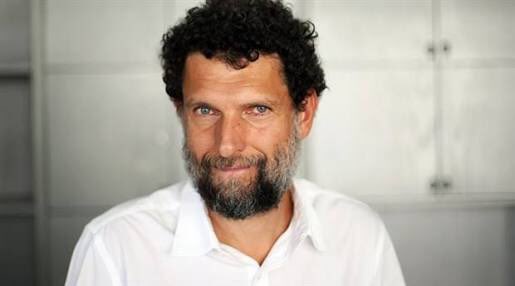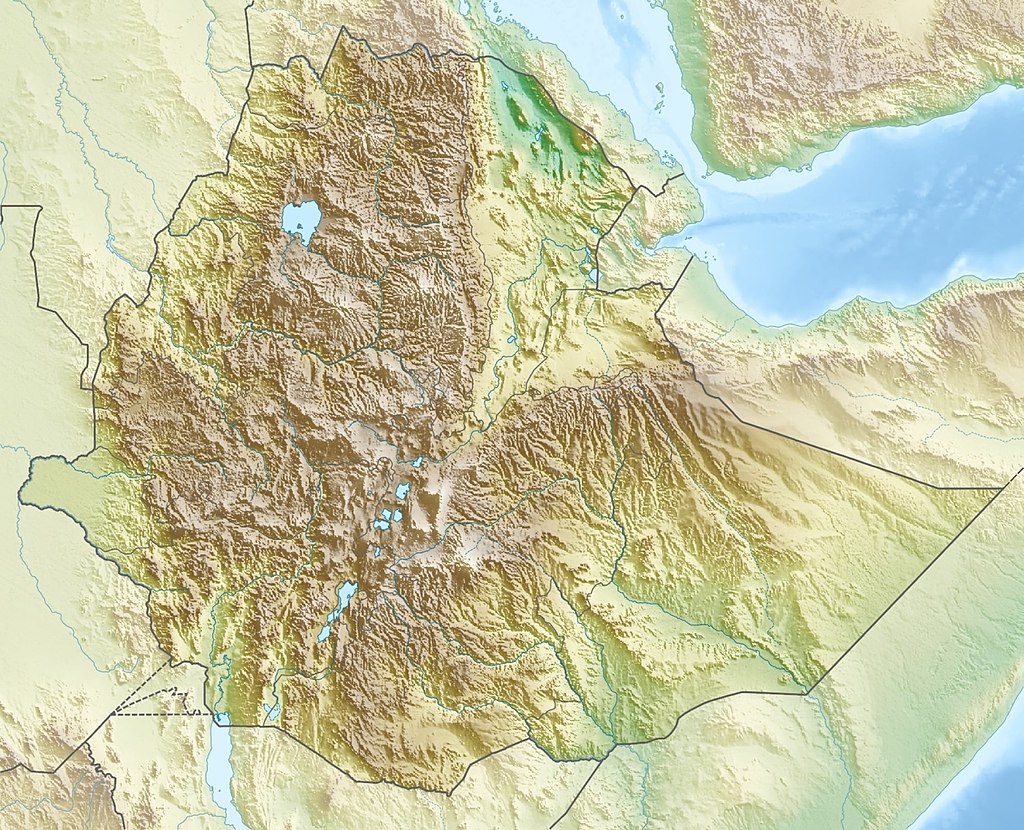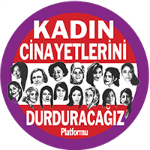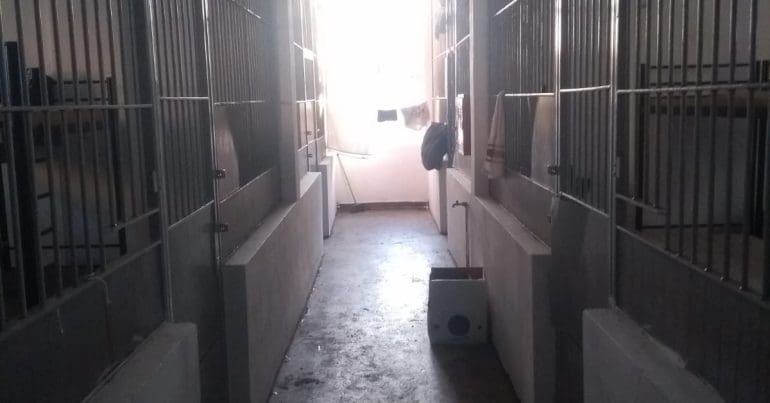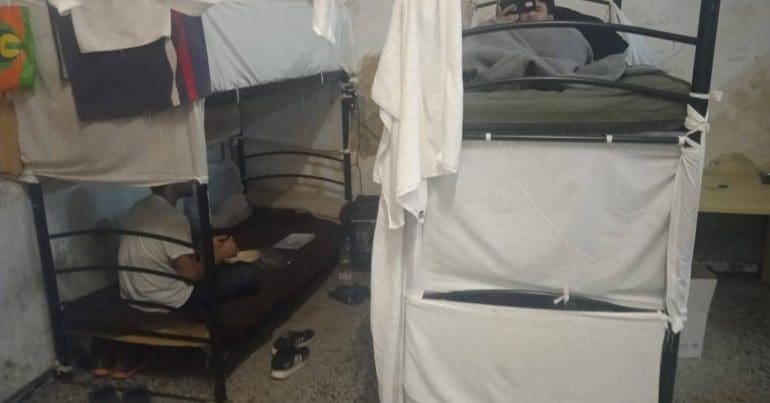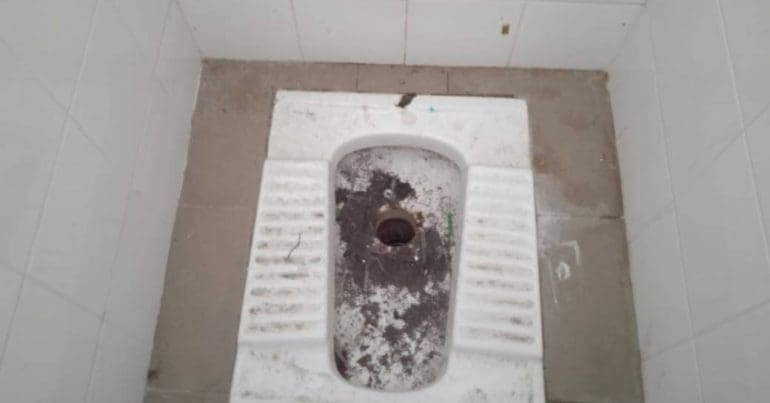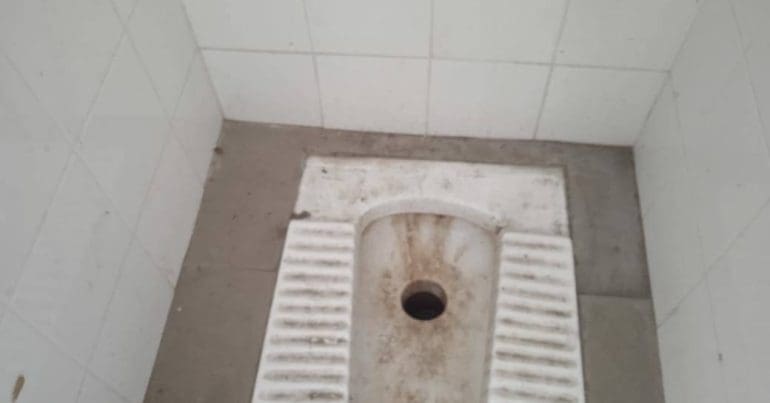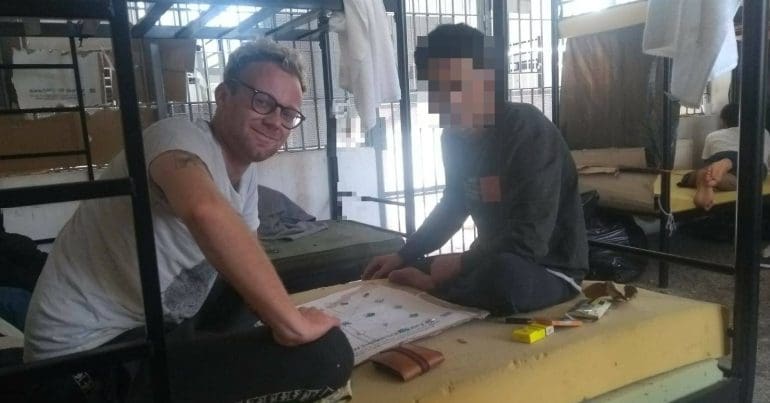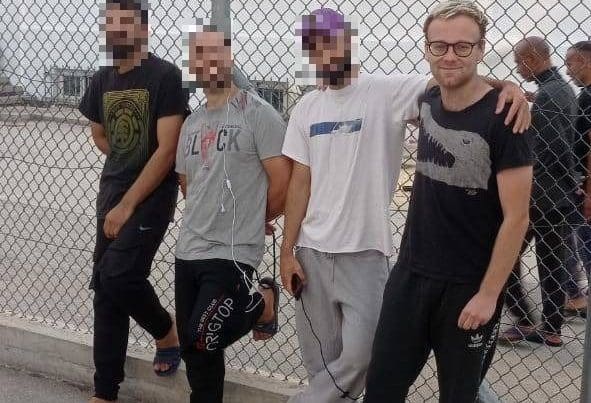Guards come and laugh at me through the bars of my cell.
“You’re the English, right?”, they ask me. “What are you doing here?”
“You tell me,” I say, for the hundredth time. But they just laugh and wander off.
I am the only Westerner in a detention centre full of thousands of refugees. I am also the only inmate waiting to be deported to the UK – though of course, I am pretty much the only person here who would not do anything for a one-way plane ticket to London. In a similar irony, the Greek police who run the facility make it very plain they do not want any of my fellow inmates (Afghans, Iranians, Pakistanis, North Africans) in their country. And yet it’s the same police force which violently arrested them and prevented them leaving.
Earlier this year, while on holiday in Greece, I was detained at the Italian border, arrested, thrown into the Greek detention and migration system for two months, and informed I was banned from the Schengen Area for the next ten years. Though I still haven’t been provided with any documentation about the ban, it appears likely that I am being targeted as a result of my reporting and media advocacy from North and East Syria (NES), the democratic, women-led, autonomous region built around Syrian Kurdistan (Rojava), which the Turkish government is hell-bent on destroying. Chillingly, it seems the autocratic Turkish government now has the power to impose a unilateral ban from Europe on a British citizen, professional journalist, and media activist like myself.
My two months in detention were just a brief taste of what many refugees, political activists, and journalists from the Middle East and beyond must spend a lifetime enduring. My case provided a window into the violence, squalor, and farce of day-to-day life in the EU’s detention-deportation machine. But it also illustrates the complicity of European states and the Turkish regime in suppressing journalistic freedom, political dissent, and democratic movements.
Inside the Greek migrant detention system
While travelling from Greece to Italy with a friend earlier this year, I was met off the ferry at the Italian border by a group of armed, balaclava-clad police. I was banned from the Schengen Area for ten years, they told me, at the request of the German government. Thus began my whirlwind tour of the Greek migrant detention system. The port where I was arrested, Ancona, lies on a popular route for people without papers trying to travel through Greece on to Western Europe, and so the Greek police simply dealt with me as they would deal with any irregular migrant pushed back from Italy by the Italian police.
I was variously detained in Patras police station, the notorious Migrant Pre-Removal Detention Center at Korinthos which was condemned by the Committee to Prevent Torture, and another Pre-Removal Center in Petrorali, Athens. Conditions were as you might expect. The police station in Patras only has small holding cells, but I spent a week here sleeping on the bare stone. Others were held in the same conditions for a month or more. For days at a time, I was locked in my cell and not allowed to mix with other inmates, passing the time squashing cockroaches and playing chess with myself on a contraband paper set. Most of my fellow inmates were cut and bruised from the beatings they’d received upon arrest, trying to smuggle themselves on to ferries at the port. On one occasion, the police violently beat a petty drug dealer on the floor outside my cell.
One day myself and a group of my new friends – Afghan migrants – were handcuffed and bundled into a windowless van. To keep us quiet, the police implied we were soon to be released, but instead we found ourselves issued with new prison numbers and lined up along the wall at Korinthos, a massive, police-run prison facility officially known as a ‘Pre-Removal Detention Center’. This name, we soon learned, had become a farce, since there were virtually no ‘removals’ (deportations) taking place due to the coronavirus (Covid-19) crisis.
Officially, people here should have exhausted all possible legal routes to remain in the EU, or else have voluntarily accepted deportation. In practice, they are held for six to eighteen months, or even more. before suddenly being released – sometimes with the assistance of the shadowy lawyers who circle the centre like vultures demanding huge cash payments for unclear forms of ‘assistance’ – sometimes seemingly at random. People are interviewed about their asylum cases, but these days everyone is being rejected, regardless of the validity of their case. Some people are released, re-arrested days later, and placed back in the detention centre for another undetermined spell.
In Korinthos, as elsewhere, the system is totally opaque. All NGOs are banned from entering. Particularly Kafkaeseque is the way some guards will tell you whatever you want to hear; some will say they know nothing, and some will tell you to fuck off, with added racist abuse, where applicable. But they are all simply trying to make their own lives easier. It’s impossible to know how your case is going, where you will be sent next, when your interview will be, whether the lawyers (who never actually visit their clients in the detention facility, only occasionally shouting at them through the barbed wire) really can speed up your release. The conditions are squalid, with frequent water outages, and up to forty men sharing each cell.
The result is desperation. In the cell where I stayed, one Kurdish refugee had recently killed himself in desperation, hanging himself with two phone chargers woven together. The lights are kept burning 24 hours a day, and yet when the residents need a doctor, or the water runs dry, no-one comes. I see one long-term inmate climb up the prison building and threaten to throw himself off just to get access to a dentist.
Another slashed himself all over with a razor after being consistently denied access to the doctor for his agonising kidney problems. There are hunger strikes, fights, and clashes with the guards with stones, and burning mattresses. For the final two weeks, I am transferred to a higher-security facility in Petrorali, Athens, where we once again spend most of the time in isolation. Here, more troubled inmates kept in isolation thrash against the bars, screaming, cursing, begging, fighting.
Rumours fly through the bars as frequently as the cigarettes and teabags passed around via cardboard chutes. Transfers occur in windowless vans. On arrival at a new facility, we are stripped and cavity searched, have our blood taken and are given injections, but not told what the injection is for, fostering a dangerous paranoia among the migrant population.
When I arrive at Petrorali the medical staff tell me, laughing, that I have somehow contracted multiple forms of hepatitis: that I will never be able to have children: and that there’s nothing to be done about this. They send me back to my cell, untreated. It’s only after many weeks of worry later, back in England, that my doctor tells me I have nothing to worry about, and what the Greek tests picked up were my vaccinations against the disease. Whether this was done through malice or oversight, I don’t know.
I see much comradeship and joy too. In Patras, a brace of Hells’ Angels held on drug charges make the migrants and I laugh by breaking wind. They also share the festal food brought in by their wives for orthodox Easter, and advise the young Afghans on how to handle the guards.
In Korinthos, we organise language classes, legal training ahead of the migrants’ admissibility interviews, work-out sessions where we leg-press the fattest guy in the cell, and hold a clandestine livestream where we relay conditions in the prison to the outside world. We play ludo, chess, football, run out into the yard in the rain, and belly-flop on the flooded concrete. I write poetry on the cell wall, Blake, Milton: the mind is its own place, and in itself can make a heaven of hell, a hell of heaven. We laugh a lot, debate politics and religion, comfort one another as best we can.
When I am woken at dawn for the last time and put on a plane back to the UK, my overriding emotion is guilt that I cannot bring all my new friends and comrades with me. It’s all I can do to dish out my last remaining cigarettes before I am handcuffed and swept away.
A cause worth defending
Six months later, back in the UK, I am still trying to get my hands on any official paperwork to explain exactly what has happened. Since I have never had anything to do with the German authorities and given Germany’s strong trade ties and strategic relationship with Turkey, it appears likely Turkey asked Germany to issue the ban. This was done via an opaque institution known as the Schengen Information System, which has been the target of sustained criticism by academics, EU bodies and civil rights organisations since its inception.
But why should the Turkish government care so deeply about a British journalist on holiday in Greece? You will have seen the world-famous images of ‘Kurdish women fighting ISIS’ broadcast around the world, as Kurdish-led forces spent years pushing back ISIS from strongholds like Raqqa before totally eradicating their caliphate in March 2019 – as the main partner force of the Global Coalition to Defeat ISIS, led by the US but including the UK, Germany, and most Schengen Area member states. You will probably also have seen footage from the two Turkish invasions of the region, including the October 2019 assault green-lit by Donald Trump. Turkish warplanes and tanks backed radical militias, including scores of former ISIS members, to take over swathes of NES, looting, raping, pillaging and murdering as they conducted forcible ethnic cleansing against the region’s Kurdish, Yezidi, and Christian minorities.
And beyond the frontlines, the political project in NES has endured. Several million people now live in a system of direct, grassroots democracy, with guaranteed female participation and women’s leadership at all levels of political and civil life. The project is not flawless, but in a region beset by war, poverty, and a total breakdown of infrastructure, NES continues to guarantee remarkably high standards of human rights, rule of law, and due process. The three years I spent living and working in NES were an education in both utopic thinking and practical action, as I witnessed refugees coming together around cooperative farming projects to beat the Turkish-imposed embargo on the region, and the women of Raqqa taking control of their own autonomous council in defiance of ISIS’ continued presence. The revolution is very much alive.
You may also be aware that a number of Westerners have travelled out to join the ‘Rojava revolution’. At first, many joined the military struggle against ISIS, with scores sacrificing their lives in the process. But these days, the majority of Western volunteers work in the burgeoning civil sphere, in women’s projects, health, education – or, in my case, media.
I am a professional journalist, and during my time in Syria, I filed reports for top international news sources like VICE, the Independent, and the New Statesman, as well as hosting a documentary series for a Kurdish TV channel. But my main role was as a co-founder of the region’s top independent news source, Rojava Information Center (RIC). As RIC, we worked with all the world’s top media companies and human rights organisations, including the BBC, ITV, Sky, CNN, Fox, Amnesty, Human Rights Watch, the United Nations, the US Government, and many more, to help them cover the situation on the ground.
Our raison d’etre was connecting these news sources with people on the ground, to help them understand the reality of NES, without propaganda. I never sought to hide my presence in Syria, or what I was doing there. On the contrary, I was proud to lend my voice to advocate for a political project I wanted the international community to recognise, understand, and engage with.
Political repression
Working in Kurdistan as a journalist is enough to incur political repression from Turkey. Turkey is the world’s number one jailer of journalists, has the highest incarceration rate in Europe, and in recent years has dismissed or detained over 160,000 judges, teachers, civil servants, and politicians – particularly targeting Kurdish politicians and members of the pro-Kurdish and pro-democratic HDP party. Turkey’s actions reach far beyond Turkey and the regions it invades and occupies in Syria and Iraq, with Turkish intelligence going so far as to assassinate three female Kurdish activists in Paris in 2013, while fascist ‘Grey Wolves’ paramilitaries linked to Recep Erdoğan’s AKP party regularly carry out violent attacks in Europe.
The EU must turn a blind eye to these abuses because it relies on Turkey to host millions of refugees who would otherwise travel to Europe. Turkey uses these refugees as leverage to threaten Europe, even while its invasions of NES and military interventions in Libya, Nagorno-Karabakh, and elsewhere force hundreds of thousands of people to flee their homes in the face of ethnic cleansing. Absurdly, even Kurdish refugees in the EU must prove that Turkey is not safe for them, with almost all applications being rejected. If Turkey was shown to be unsafe, after all, that would mean the EU admitting it was refouling migrants into life-threatening danger, in defiance of international law.
The issue is not Turkey alone. EU and Western governments regularly target, harass, and detain their own nationals for lending support to the democratic project in NES or the Kurdish rights movement. Volunteers who fought against ISIS have been charged and jailed in Denmark, Australia, Italy, Spain, France and my own home country, the UK. Danes and Australians can be jailed simply for setting foot in NES – something the UK has threatened but not yet enacted.
Fighting for women’s rights, democracy and freedom should not be a crime. But as my case illustrates, this repression is not limited to combatants. In the UK, even members of ecological delegations have been detained under terror laws and prevented from travelling to the region. Facing intense, targeted police harassment, unable to find work as a result, feeling isolated and alone, several former volunteers have killed themselves. At least one other British volunteer in NES has been handed the same ten-year ban from the Schengen Area as myself, and we suspect other peaceful activists have also been listed on the SIS.
Turkish pressure, therefore, contributes to Western governments’ own desire to stop the spread of the decentralised, transformative vision of society put forward by NES. (Turkey, of course, knows they incur much more negative press when their bombs kill British or European citizens than when they are simply wiping out Kurdish and Arab locals – one reason why continued Western engagement in NES is so important.)
Erdoğan is able to use the millions of Syrians now resident in Turkey to tacitly or openly threaten Europe with another influx of refugees if it does not consent to his demands. The UK is particularly close to Turkey as a key trading partner, the more so post-Brexit, and accordingly takes a much harder line against NES than, say, France or the USA, both of whom have welcomed NES’ political leaders to the White House and the Champs-Élysées. Notably, in the UK, repressive moves have come in response to high-level meetings between Turkey and the UK, in particular when arrests targeted not only former volunteers in NES but even their family members in the days following Erdoğan’s 2019 visit to London.
The same shared interests lie behind my own, relatively brief, detention. The political movement in NES resists borders and the violence inherent in the capitalist nation-state. These ideas are anathema to Erdoğan, but they also constitute a challenge to the EU border regime. Little wonder, then, that Turkey and the EU work together to stifle legitimate journalism and political advocacy.
Outside the law
As the British novelty act in the Greek detention centre, I was of course spared the racism, the violence, and the worst of the uncertainty. I knew it would only be so long before I was back in the UK, where, though I had to sit through a ‘Schedule 7’ interview on my return, the police assured me that I was not facing charges and had done nothing wrong in the eyes of the law. It is an immense frustration to be summarily banned from Europe, but then I FaceTime with friends still detained in Korinthos or playing the dangerous ‘game’ trying to jump onto lorries at Patras ferry port, and I remember how incredibly free I am.
The effect of repression against Western volunteers, activists and journalists who have worked in NES is to place us, temporarily, outside the normal protections afforded to UK or EU citizens. Millions of civilians in NES, like millions of migrants in Europe, exist in this vacuum as their constant condition. Turkey feels it has impunity to rape, murder, bomb and ethnically cleanse in NES, which remains unrecognised by any government or international organisation, despite its leading role in defeating ISIS.
The Greek police can beat, humiliate, and dehumanise the migrants in Patras, Korinthos, or Petrorali as much as they please, knowing no lawyers or NGOs are able to enter the detention centres to monitor their behaviour. The inmates of the Greek migrant detention system and the free people of NES are both victims of the same system, which sacrifices peoples’ lives in the name of bilateral trade agreements, arms sales, and ethno-nationalist state politics. But this is precisely why I, and other international supporters of the political movement in NES, have chosen to make our voices heard, even in the face of imprisonment and police repression. This is why I hope my ban will be overturned, and that I can continue my peaceful journalism and advocacy in support of this vital cause.
The vision being promoted in NES, of local, decentralised, grassroots democracy, is the only way to resolve not only the Syrian conflict but also a global crisis occasioned by capitalist extraction overseen by neo-imperialist states. Only in this way can we provide people with what they want most – a safe home they have no need to flee.
Featured image and all other images via the author
By Matt Broomfield
This post was originally published on The Canary.
